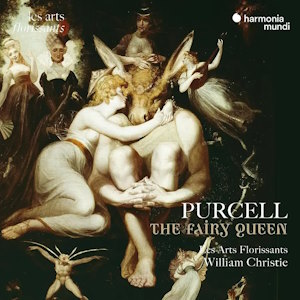
Henry Purcell (1659-1695)
The Fairy Queen (1692)
Les Arts Florissants/William Christie
rec. 1989, Théâtre de la Colonne de Miramas (Bouches-du-Rhône)
Libretto enclosed
Reviewed as download from press preview
Harmonia Mundi HAF8901308.09 [127]
Today Purcell’s only genuine opera, Dido and Aeneas, is without doubt the most frequently performed baroque opera, and there are recordings aplenty. However, it only seems to have been played only once during the composer’s lifetime. On the other hand, his semi-operas were very popular, and the greatest success was The Fairy Queen. Admittedly, it was the lavish production just as much as the music that attracted the audiences, and the costs were so high that they had to repeat it the following year to avoid bankruptcy. For that revival, Purcell added some new music, and this recording contains all the music from both years. The result is a rather long work, and at times one feels that it could have been trimmed down a little – but that would have robbed us of some good music, and it has to be said that Purcell was truly inspired when he wrote this. The play was based on Shakespeare’s A Midsummer Night’s Dream with a libretto by an unknown author. It is a pity that Purcell didn’t get an opportunity to set anything genuinely Shakespearean, but even so it is a pleasure to return to this work after many years. In the LP-era I owned a recording conducted by the legendary Alfred Deller, but it went to the dustbin when I disposed of my whole LP-collection some ten years ago. I have rather vague memories of it, but I have several other wonderful Purcell recordings with Deller: some very early from the 1950s when he was at his freshest, but also a marvellous recording of The Plaint from the last act of The Fairy Queen, recorded in 1979, the year he died aged 67, his voice still in mint condition. It is the most moving rendition of the song I can imagine.
I have for quite some time lived with Harnoncourt’s recording, which has some wonderful singers, the lovely Barbara Bonney being perhaps the cream of the cream. As so often, Harnoncourt’s conducting is the moot factor. He is never dull but quite often eccentric and wayward, and this is probably the reason why I haven’t listened very often to that set. William Christie is less egocentric, and his singers are in the same class as Harnoncourt’s. It is a more slimline, elegant, Gallic performance, if you like. There are many other recordings available, but the Harnoncourt is the only one I have listened to in depth. What struck me when I first listened to it, and again when hearing the Christie, is the quality of the music. Purcell, who died at only 36, marginally older than Mozart, composed an enormous amount of music, and whenever one dips into his works at random one is stunned by the many-sidedness of his genius. There is a freshness, inventiveness and melodic multitude that constantly surprise. Boisterous joy contrasts with serene nobility and his music is never longwinded or banal. He is also a masterly orchestrator, considering the limited number of colours the instruments at his disposal could produce – compared, that is, to later generations of composers: Berlioz, Mahler and Ravel, to name just three. He is also rhythmically inventive, and all the short instrumental pieces are a joy to listen to.
William Christie founded Les Arts Florissants in 1979, so it was a well-established ensemble when this recording was made ten years later. Many well-known performers can be found in both the orchestra and vocal ensemble. Christophe Rousset, who here plays clavecin and organ, is today well established as a leading baroque leader, and among the singers we find sopranos Nancy Argenta, Lynne Dawson, Véronique Gens, Sandrine Piau, Noémi Rime, hautes-contre Charles Daniels and Jean-Paul Fouchécourt, tenor Thomas Randle and bass Bernard Deletré – an admirable group, here relatively early in their careers. Unfortunately there is no indication in the booklet of who sings what, but the singing is uniformly good, and there is a lot of telling characterisation. Listen to the blind poet at the beginning of act I (CD 1 track 7)! He is truly burlesque. In spite of the age of the recording, the sound comes up as fresh as new paint.
I derived a lot of pleasure from this issue and will certainly return to it in the future but will also keep Harnoncourt as a worthy complement, warts and all. For a newcomer to The Fairy Queen, it is worth noting that the Harnoncourt can be bought as a download in FLAC quality for less than half the price of the Christie. Whichever you acquire, you get music of the highest artistic quality.
Göran Forsling
Help us financially by purchasing from


Cast
Sopranos:
Nancy Argenta, Lynne Dawson, Isabelle Desrochers, Willemijn Van Gent
Véronique Gens, Sandrine Piau, Noémi Rime
Hautes-contre:
Charles Daniels, Jean-Paul Fouchécourt, Mark Le Brocq, Christophe le Paludier
Ténors:
Bernard Loonen, François Piolino, Thomas Randle
Baryton:
François Bazola
Basses:
Jérôme Correas, George Banks-Martin, Bernard Deletré
Thomas Lander, Richard Taylor

















